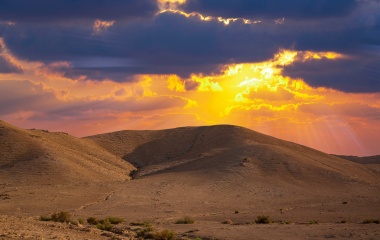
What is the role of the Jewish people? To give some insight to this most complex question we must first analyze why G-d created man in the first place. While it is hubris to claim that we might know the answer to this question from the perspective of G-d, it behooves us to struggle with this question from the perspective of man.
What is our role in the universe? How can we act so that our sojourn in this world fulfils and important purpose?
The Torah opens with a (vague) description of Creation culminating in the creation of man, whom the Bible tells us is created in the image of G-d. Put slightly differently G-d created man so that He could have a relationship with him. Hence the first question G-d asks man is ayeka, "Where are you?" (Breisheet 3:9). G-d wants man to be near Him, and sadly man often expends much effort to run away from Him[1].
Sadly, G-d’s plan did not work out as envisioned “And the Lord saw that the evil of man was great in the earth, and every imagination of his heart was only evil all the time. And the Lord regretted that He had made man upon the earth, and He became grieved in His heart” (Breisheet 6:9). G-d decided to destroy the world – man was not fit to be G-d‘s partner – but upon seeing Noach decided to give it another try. This attempt worked a bit better but was not quite good enough.
Instead of partnering with G-d, man competed with Him. “And they said, ‘Come, let us build us a city, and a tower with its top in the sky, to make a name for ourselves; else we shall be scattered all over the world” (Breisheet 11:4). G-d did not destroy but He did disperse. And at this point He called on Avraham to leave his home and surroundings and travel to a far-off land where G-d would establish a special relationship with him, one based on tzedakah and mishpat, justice and righteousness (Breisheet 18:19). Not yet knowing what his mission would be, Avraham hearkened to the voice of G-d and soon upon arrival “he built there an altar and called out in the name of G-d” (Breisheet 12:8), clearly distinguishing himself from those who sought to “make a name for ourselves”. From this point on Avraham – and the nation he would form – are tasked with bringing man closer to G-d.
Moshe – to jump ahead just a bit - in his valedictory speech to the Jewish nation expands upon this idea. “Observe them [the laws of the Torah] faithfully, for that will be proof of your wisdom and discernment to other peoples, who on hearing of all these laws will say, ‘Surely, that great nation is a wise and discerning people’” (Devarim 4:6). These are astounding words – well actually they are very basic words that may be astounding to some, explaining why we are to keep the mitzvot of the Torah. The mitzvot are the application of the wisdom of the Torah, the wisdom of G-d and thereby help bring people – non-Jewish people – closer to G-d[2]. Justice for all, proper treatment of the stranger and outsider, its laws of gossip, shabbat, laws of commerce, and honouring the elderly are just some of the wise laws of the Torah.
In a remarkable comment the Bechor Shor, notes that Moshe is referring to “even in the eyes of the nations that do not accept the Torah”. It is one thing for a Christian or Muslim to see wisdom of the Torah – after all, their religious beliefs acknowledge G-d’s giving of the Torah. It is quite another to convince those of other religions, or of no religion at all[3]. But that is our mission. To demonstrate to non-believers, to atheists, humanists, pagans and everyone in between, including many a Jew, that the Torah is the greatest book of wisdom. We must demonstrate even to those who do not believe in G-d the beauty and wisdom of G-d’s great gift to humankind (though probably best not to quite phrase it like that). Even, perhaps especially an atheist, has much to gain from observing a day of rest.
Tragically, 2,000 years of exile, pogroms, persecution and a Holocaust have encouraged and forced Jews to ignore this important aspect of the Torah. But now that we have returned to be sovereign in our Land we must return to this basic message of the Torah. With the ability to implement so much of the Torah we must do so in a way that Jew and non-Jew alike will say “Surely, this great nation is a wise and discerning people.”
[1] This is the message as Yom Kippur – the day we try to come close to G-d - nears a close. We read of Yonah, trying to flee from G-d and G-d’s insistence he go to a non-Jewish city to implore them to repent. Jew and non-Jew alike are created in the image of G-d.
[2] Presumably, but unfortunately not necessarily, the Jewish people are long aware of the wisdom of the Torah.
[3] Living in a time when all societies were religiously based with no such concept of separation of church and state the Bechor Shor refers only to other religions. But we understand the verse is also talking to the many non-believers amongst us.



